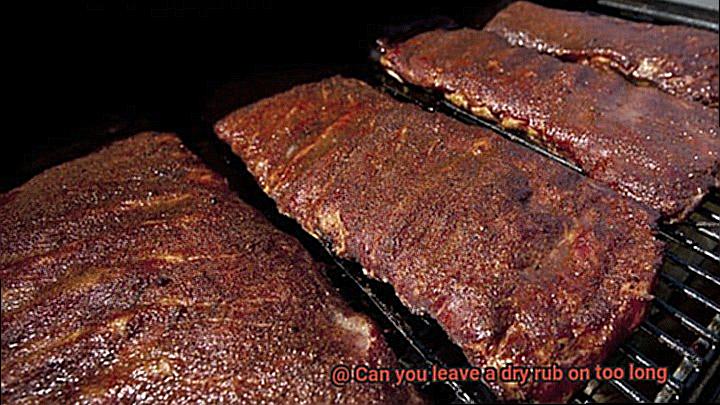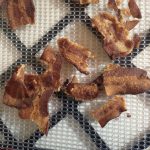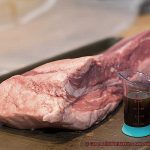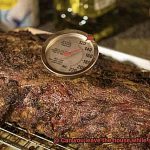Are you planning a backyard barbecue this weekend and wondering how long to keep the dry rub on your ribs or brisket? As a home cook or budding pitmaster, it’s natural to worry about leaving the rub on too long and potentially ruining your meat. But fear not, because today we’re going to tackle the age-old question – can you leave a dry rub on too long?
We’ve all heard that “patience is a virtue,” and that’s especially true when it comes to dry rubs. It’s crucial to give the spices enough time to penetrate the meat for maximum flavor. But is there such a thing as leaving it on for too long?
In this post, we’ll delve into the science behind dry rubs, explore the ideal time for letting them sit, and reveal what happens if you overdo it. We’ll also share some tips and tricks to ensure that your dry rub enhances your meat’s flavor instead of overpowering it.
So, grab your apron and get ready to satisfy those taste buds as we uncover the truth about leaving dry rubs on for too long.
Contents
What is a dry rub?
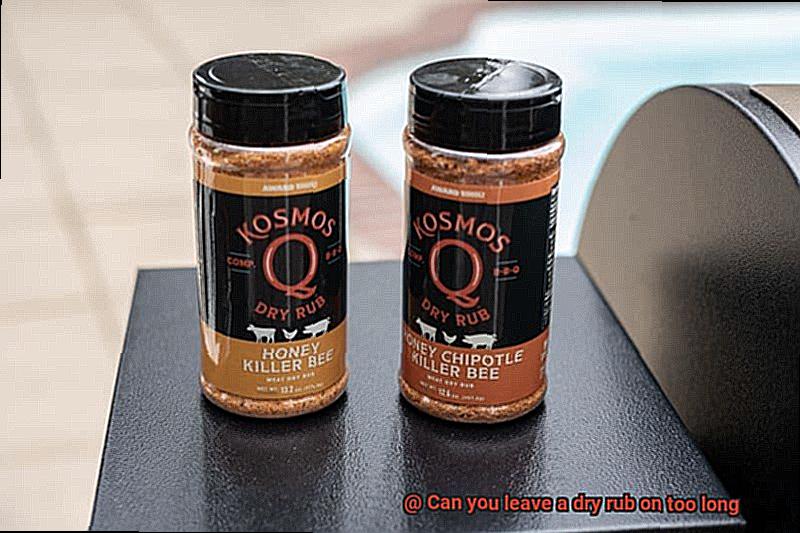
Let me tell you all about dry rubs. A dry rub is a powerful combination of spices, herbs and seasonings that blend together to create a flavorful crust or coating on meat or vegetables. Unlike marinades that seep into the food, dry rubs sit on the surface and infuse their flavors into the meat, making it perfect for grilling or smoking meats such as pork, chicken, or beef.
The secret to a great dry rub lies in finding the perfect balance of flavors. Common ingredients include salt, pepper, garlic powder, onion powder, paprika, chili powder, cumin, and brown sugar. However, there are countless variations of dry rubs that can be created by adjusting ratios or adding different spices and herbs.
Timing is key when it comes to using a dry rub. To achieve the maximum flavor intensity, allow your rub to sit on your meat for at least 30 minutes but no more than 24 hours. Leaving it for too long can break down delicate proteins in fish or poultry and result in a mushy texture.
Aside from its delicious taste, dry rubs are an excellent way to add flavor to your grilled or smoked meats without adding extra calories or fat. They also allow for customization and experimentation with different spice blends to find your perfect flavor combination.
Can you leave a dry rub on too long?
When it comes to grilling, dry rubs are a go-to for adding flavor to your meats. But can you leave a dry rub on for too long? As an expert on this topic, let me tell you that the answer is yes, and it can ruin the taste and texture of your meat.
When you apply a dry rub to your meat, the spices and seasonings begin to break down the surface of the meat, which helps to enhance the flavor. However, if left on for too long, the salt in the rub can draw out moisture from the meat, making it tough and dry. This is especially true for lean cuts such as chicken breasts or pork chops.
Here are some things to consider to avoid this mishap and still get maximum flavor intensity from your dry rub:
- Type and Thickness of Meat: Thicker cuts like brisket or pork shoulder require a longer marinating time than thinner cuts like chicken breasts or pork chops. Be sure to adjust your marinating time accordingly.
- Strength of Your Rub: If your rub is particularly strong, it may not need as much time to break down the surface of the meat. Adjust your marinating time based on the strength of your rub.
- Desired Level of Flavor: If you want a more intense flavor, you may be tempted to leave the rub on for longer. However, it’s best to stick to recommended marinating times to avoid ruining the taste and texture of your meat.
As a general rule of thumb, it’s best to leave a dry rub on for no more than 24 hours before cooking. For thicker cuts of meat, you may need up to 48 hours but be sure not to exceed this time limit.
What are the effects of leaving a dry rub on for too long?
Applying a dry rub is a common practice, but be warned: leaving it on for too long can have some serious negative effects on your end result. As an expert in all things grilling, I’ve done the research for you so you can avoid making these common mistakes and create mouthwatering dishes every time.
Firstly, leaving a dry rub on for too long can make your meat overly salty or spicy. The salt and seasonings in the rub penetrate the meat and create an overpowering flavor if left on for an extended period of time. Additionally, some spices can become bitter and lose their flavor when left on for too long.
But that’s not all. Leaving a dry rub on for too long can also cause your meat to become dry and tough. The salt in the rub draws out moisture from the meat, making it less tender and juicy. Moreover, acidic ingredients in certain rubs can break down the proteins in the meat, resulting in a mushy or stringy texture.
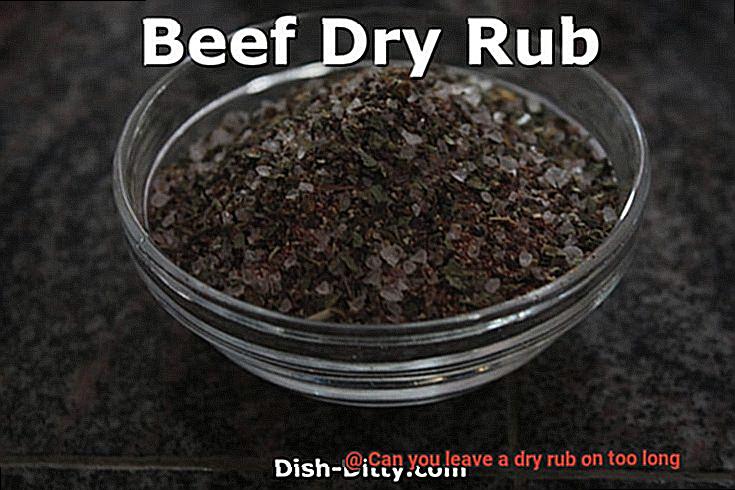
To add insult to injury, leaving a dry rub on for too long can also ruin the texture and appearance of your meat. Rubs containing sugar or other sweeteners can burn or caramelize on the surface of your meat if left on for too long. This creates a charred or crusty coating that nobody desires.
What are the effects of leaving a dry rub on for too short a time?
Nothing beats a perfectly seasoned piece of meat. However, if you don’t let your dry rub work its magic for long enough, you may end up with less than stellar results. Let’s delve into the effects of leaving a dry rub on for too short a time.
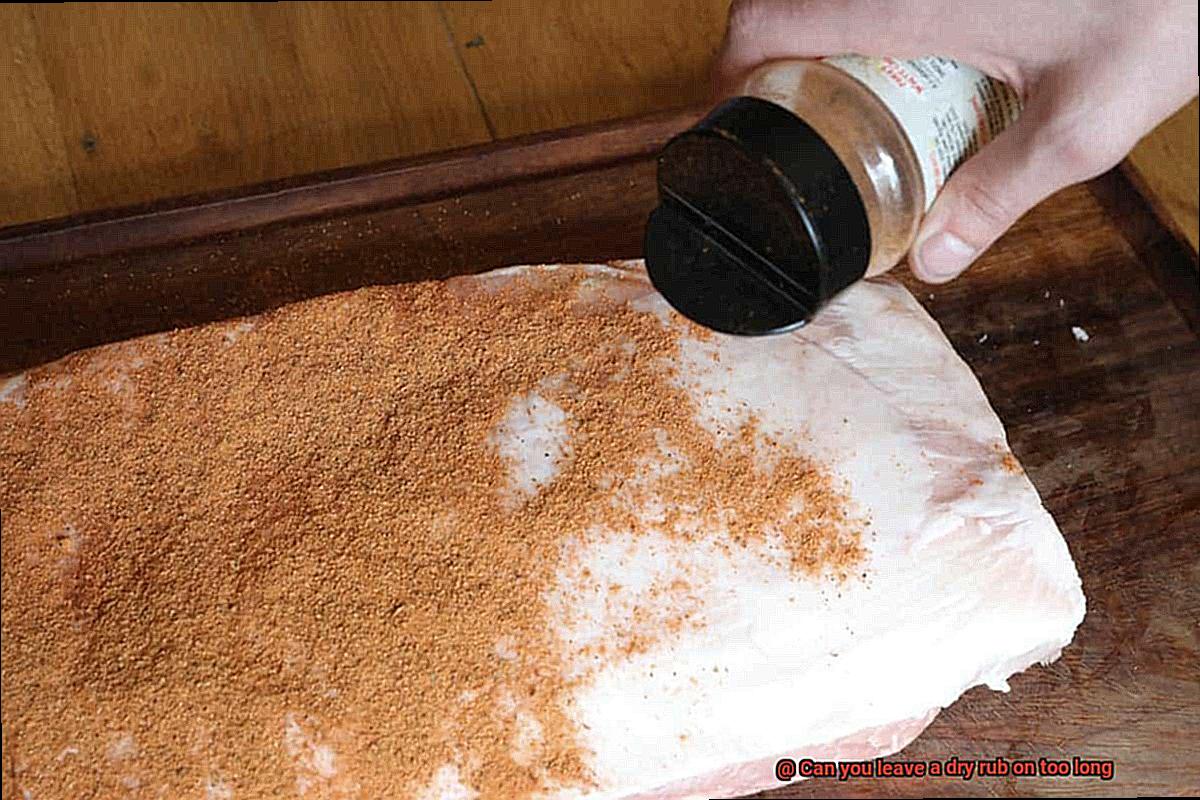
Firstly, let’s talk about flavor infusion. A dry rub is not just a sprinkling of spices – it’s a blend that should penetrate deep into the meat. If you don’t leave it on for an adequate amount of time, you may end up with lackluster flavor. The spices won’t have enough time to seep into every crevice, resulting in less complex and satisfying taste.
Next up, texture is crucial. A good dry rub contains salt, which helps tenderize the meat. However, if you don’t give it enough time to work its magic, the meat may end up tough and chewy. Nobody wants to gnaw on their steak like a caveman – give your meat time to break down and become juicy and tender.
Finally, let’s talk about visual appeal. A dry rub can add beautiful color to your meat, making it even more appetizing. If you don’t give it enough time, the color may not develop fully, leaving you with a less than stellar-looking dish.
How long should you leave a dry rub on?
One of the most important aspects of using a dry rub is knowing how long to leave it on. As an expert in this area, let me guide you through the ultimate tips and tricks to ensure your meat is always juicy, tender, and packed with flavor.
First off, it’s important to note that the length of time you should leave a dry rub on can vary depending on factors such as the type of meat and the specific rub being used. However, there are some general guidelines you can follow.
In general, you should aim to leave your dry rub on for at least 30 minutes before cooking. This allows the flavors to penetrate the meat and transform it into a mouth-watering masterpiece. But don’t be afraid to experiment with longer or shorter times depending on your personal taste.
For example, if you’re using a salt-based rub like a classic BBQ blend, you can leave it on for several hours or even overnight. The salt will help to tenderize the meat and enhance its natural flavors without overpowering it. However, if your rub contains acidic ingredients such as lemon or vinegar, it’s best to only leave it on for a short period of time – around 30 minutes to an hour. The acidity can break down the meat fibers and make it mushy if left on for too long.
To summarize:
- Aim to leave your dry rub on for at least 30 minutes before cooking.
- Salt-based rubs can be left on for several hours or even overnight.
- Rubs containing acidic ingredients should only be left on for a short period of time (around 30 minutes to an hour).
- Experiment. Personal preference plays a big role in determining how long to leave your dry rub on.
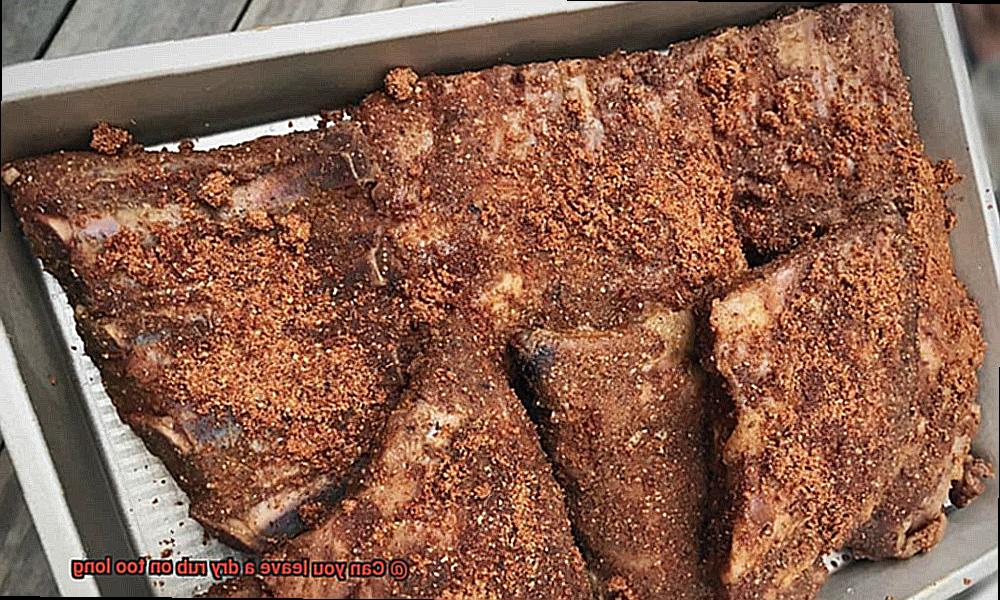
Is it safe to eat meat that has had a dry rub left on for too long?
If you’re one to savor the flavors of a perfectly seasoned piece of meat, seasoned with dry rub, you may be wondering if it’s safe to consume meat that has been left in a dry rub for too long. As a self-proclaimed dry rub aficionado, I’m here to quell any doubts and provide reliable information on the matter.
Before delving into the safety concerns, let’s explore what dry rubs are. Dry rubs are composed of a blend of spices, salt, and sugar that are massaged onto the surface of meat before grilling or smoking. The ingredients used in the dry rub can significantly impact whether the meat is safe to eat after being marinated. However, generally speaking, dry rubs contain salt and sugar, which act as preservatives and help prevent bacteria growth.
Now onto the main question – is it safe to eat meat that has been left in a dry rub for too long? The answer is yes, as long as it has been adequately stored and cooked to reach the appropriate temperature. The USDA recommends cooking all meats to a minimum internal temperature of 145°F (63°C) for beef, pork, veal, and lamb cuts. Poultry should be cooked to an internal temperature of 165°F (74°C).
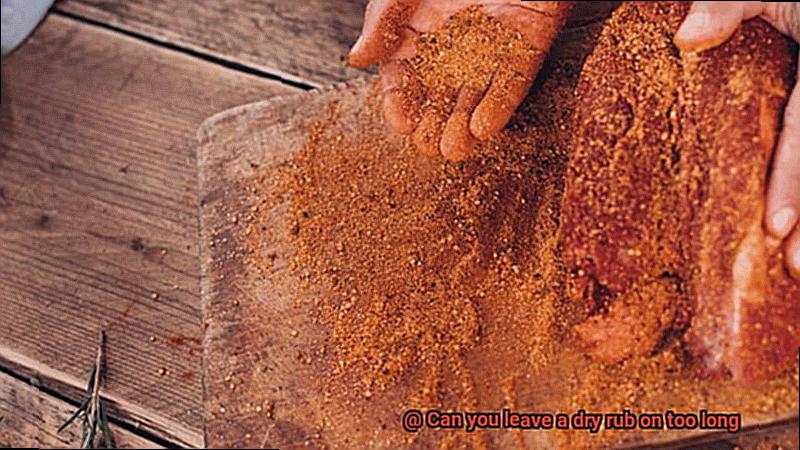
It’s essential to note that leaving marinating meat out at room temperature for an extended period can lead to bacterial growth and potential food poisoning. Therefore it’s recommended to store marinating meats in the refrigerator and not leave them out at room temperature for more than two hours.
Tips for using dry rubs correctly
Dry rubs are an excellent way to add flavor and texture to your meats, but using them incorrectly can lead to disappointment. To ensure your meats are cooked to perfection and bursting with flavor, follow these tips for using dry rubs correctly.
Follow the Recipe Carefully
When using a dry rub, it’s crucial to follow the recipe carefully. Measuring out the ingredients accurately and following any recommended marinating times is essential. If a recipe specifies a particular time for leaving the rub on, make sure to stick to it.
Don’t Marinate for Too Long
While marinating can enhance the flavor of your meat, leaving a dry rub on for too long can cause it to become tough and dry. The salt in the rub can draw out moisture from the meat over time. As a general rule, it’s best not to leave a dry rub on for more than 24 hours.
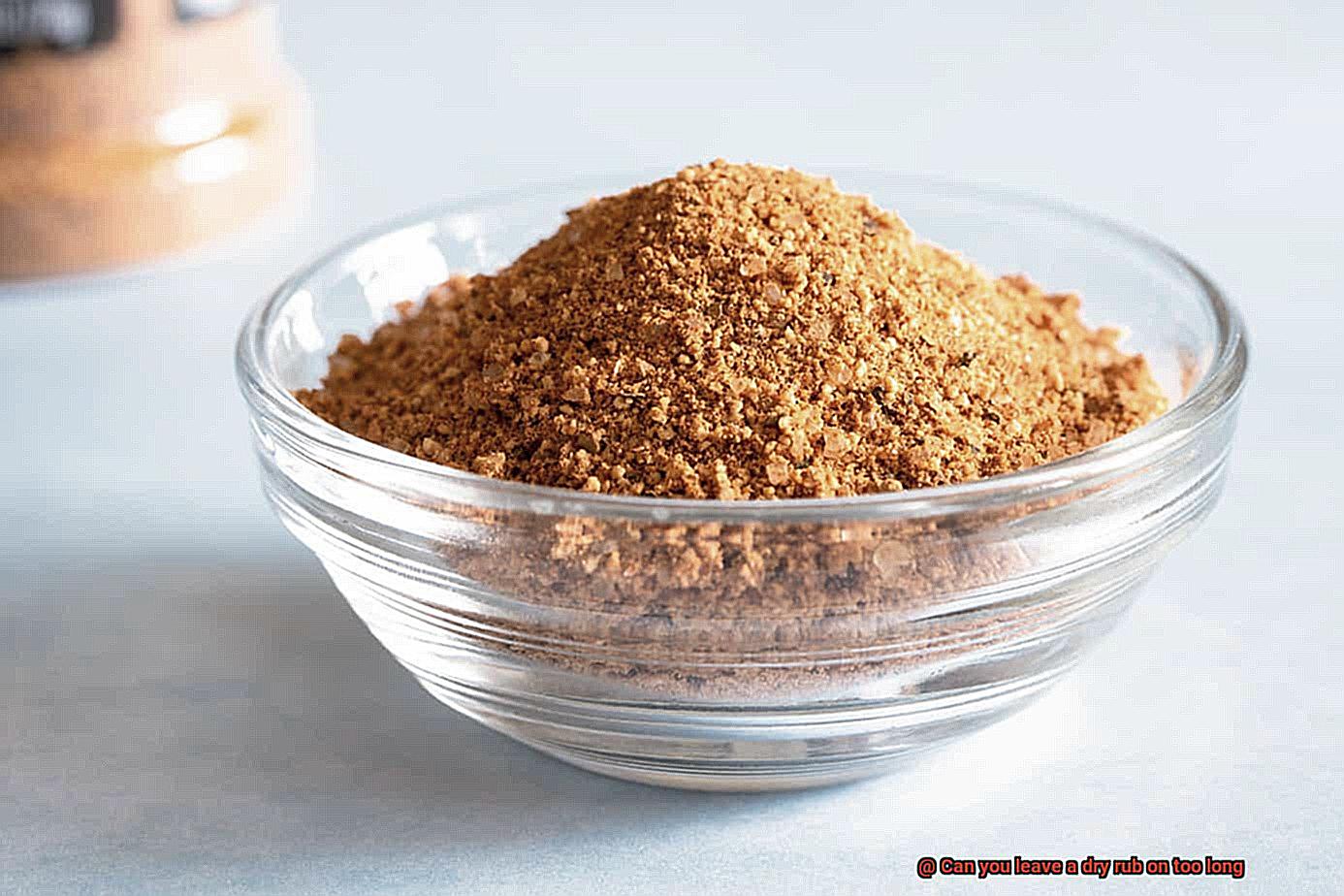
Adjust for Thicker Cuts
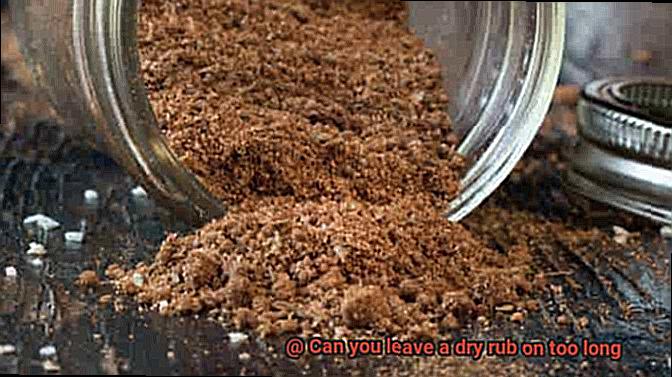
Thicker cuts of meat require a longer marinating time for the flavors to fully penetrate. However, this doesn’t mean you should leave the rub on for too long. Instead, adjust the marinating time according to the thickness of the meat.
Use a Light Hand
When applying a dry rub, use a light hand. Too much rub can overpower the flavor of the meat and make it too salty or spicy. A good rule of thumb is to use about 1 tablespoon of rub per pound of meat.
Choose Meats That Can Withstand Long Cooking Times
Tough cuts of meat such as brisket or pork shoulder benefit from long cooking times and are ideal for dry rubs. More delicate meats such as chicken breasts or fish may not hold up as well under the intense seasoning of a dry rub and may be better suited for lighter marinades or seasonings.
To ensure even distribution of the dry rub, apply it evenly over the meat using a shaker or your hands. Coat the meat thoroughly but not too heavily, as this can lead to excessive saltiness and toughening of the meat. Let the meat sit with the rub on for 30 minutes to an hour before cooking, as leaving it on for too long can result in an overly salty and tough final product.
suo7WFVmYFc” >
Conclusion
To sum it up, dry rubs can turn a bland meat into a delicious masterpiece. However, there is a fine line between perfection and disappointment when using them. It’s crucial to balance the flavors and timing to achieve the maximum intensity without sacrificing the texture and taste of your meat.
For best results, follow the recipe closely, adjust marinating times based on thickness and rub strength, apply it in moderation, choose meats that can handle long cooking times, and let it sit for at least 30 minutes but no more than 24 hours. Remember to refrigerate marinating meats instead of leaving them out at room temperature for too long.
By keeping these tips in mind, you’ll be able to create mouth-watering dishes that will leave your guests raving about your culinary skills.

